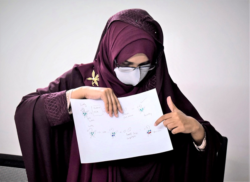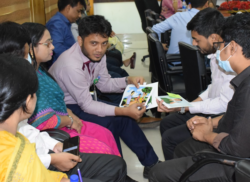How we used lessons to optimize the COSTAR AMR Trainings in Bangladesh
 The COSTAR (Community Solutions to Antimicrobial Resistance) is now entering it’s delivery phase where community dialogues will be held across Bangladesh to discuss AMR at community level. This is a huge undertaking and requires the training of several layers of facilitators to ensure the community dialogue approach (CDA) can be successfully embedded into existing structures. Over the summer members of COSTAR team convened in Bangladesh to deliver the first of these training workshops. Here Helen Hawkings (Malaria Consortium) reflects on the training process and adaptations made from the pilot study.
The COSTAR (Community Solutions to Antimicrobial Resistance) is now entering it’s delivery phase where community dialogues will be held across Bangladesh to discuss AMR at community level. This is a huge undertaking and requires the training of several layers of facilitators to ensure the community dialogue approach (CDA) can be successfully embedded into existing structures. Over the summer members of COSTAR team convened in Bangladesh to deliver the first of these training workshops. Here Helen Hawkings (Malaria Consortium) reflects on the training process and adaptations made from the pilot study.

Ensuring that volunteer community dialogue facilitators are equipped with the knowledge, skills and materials they need to guide their fellow community members through a year of interactive dialogues requires months of design, development, and preparation.
Below are 3 additional elements that have been incorporated in the 2022 COSTAR AMR One Health community dialogue trainings based on the learning about what went well, and what needed changing from the previous study on antibiotic resistance in Bangladesh.
1. Training the MASTER Trainer
An extra layer of training was added onto the previous two-level Training the Trainer and the Training the Community Dialogue Facilitator workshops. Five women and five men from the Ministry of Health and Family Welfare (MOHFW), Ministry of Fisheries and Livestock (MOFL), as well as prominent academic and research  institutions joined the Master Trainers workshop, led by trainers from Malaria Consortium and CVASU, hosted by the ARK Foundation. The aim of this higher-level workshop was not only to strengthen capacity in participatory AMR training facilitation, but also to gain multi-level, multi-sectoral Government Ministry Support to ensure that the community dialogue project is into the implementation of National AMR Containment Programme.
institutions joined the Master Trainers workshop, led by trainers from Malaria Consortium and CVASU, hosted by the ARK Foundation. The aim of this higher-level workshop was not only to strengthen capacity in participatory AMR training facilitation, but also to gain multi-level, multi-sectoral Government Ministry Support to ensure that the community dialogue project is into the implementation of National AMR Containment Programme.
2. Involving the right people
Time and resources were allocated to facilitate the engagement of key stakeholders at every stage of workshop planning and delivery, from high-level heads of governmental agencies who nominated the master trainers, and contributed to the planning and delivery of the ToT, to community gatekeepers who chose the dialogue facilitators. In the previous study only a small number of trainers carried out the bulk of the CD facilitator workshops. For this project approximately 270 dialogue facilitators and 50 supervisors will be trained (5 times more than last time) so a strong training team is imperative. Potential trainer profiles were  mapped and discussed, and trainer criteria was revised and made more specific to encourage the selection of experienced trainers with adequate time and willingness to conduct the cascade training. This time around master trainers have been enthusiastic, punctual and all but one participated in facilitating the ToT for 5 male and 15 female.
mapped and discussed, and trainer criteria was revised and made more specific to encourage the selection of experienced trainers with adequate time and willingness to conduct the cascade training. This time around master trainers have been enthusiastic, punctual and all but one participated in facilitating the ToT for 5 male and 15 female.
3. Involving the trainers in the development of the training and dialogue facilitation materials
The Master Trainer Training included sessions on communication; participatory facilitation; AMR; COSTAR, the CDA and Participatory Video; as well as opportunities for trainers to practice facilitation and giving and receiving feedback and to provide inputs into the CDA tools. Participants in both the Master Trainer and the Training the Facilitator workshops enjoyed the ‘new’, very  participatory nature of the facilitation. They felt confident with the training materials and made modifications to the materials adding a few slides to their presentations, did different engaging activities, and made it their own. Let’s see what more we learn as the cascade training continues and the community dialogues begin.
participatory nature of the facilitation. They felt confident with the training materials and made modifications to the materials adding a few slides to their presentations, did different engaging activities, and made it their own. Let’s see what more we learn as the cascade training continues and the community dialogues begin.
All pictures credited to ARK Foundation.
